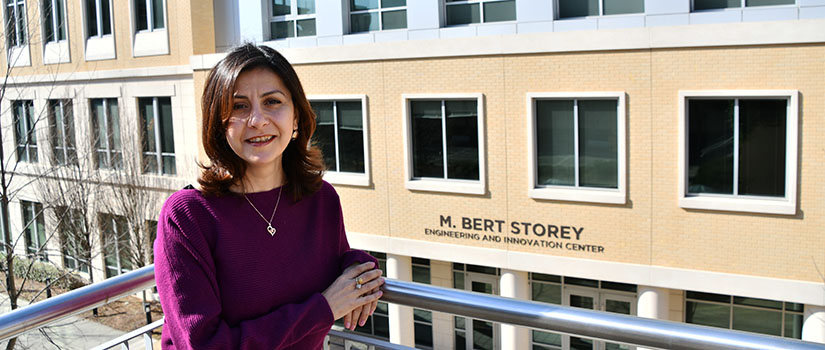Rasha Karakchi's impact on the next generation of engineers.
In the male-dominated realm of computer engineering, Rasha Karakchi stands out as not only a trailblazer but a beacon of encouragement for aspiring female engineers. Her journey of resilience and determination serves as a testament to following a passion and persevering in the face of adversity.
Karakchi’s story begins in Iraq. As one of the few female undergraduates in the computer engineering program at the University of Mosul, she embraced the obstacles and excelled in her studies, earning her bachelor’s degree with a minor in electrical engineering.
“Social norms have always discouraged women from joining the computer engineering field. This was a challenge that pushed me towards computer engineering rather than away from it. It was a journey full of challenges and obstacles but that pushed me more to continue,” Karakchi says.
In 2013, Karakchi’s pursuit of knowledge led her to the University of South Carolina, where she earned her master’s (2016) and Ph.D. (2020) in computer science and engineering. Immersing herself in research at the College of Engineering and Computing’s Heterogeneous and Reconfigurable Computing lab, led by Computer Science and Engineering Professor Jason Bakos, she was introduced and further honed her expertise in field-programmable gate arrays (FPGA) chips and technology.
"Dr. Karakchi was an exceptional graduate student working in my lab. I was impressed with her rare combination of skills in teaching, hardware design and programming as well as her natural ingenuity in solving engineering challenges," Bakos says. "I find Dr. Karakchi enjoyable and rewarding to work with, which is self-evident considering our continued collaborations."
FPGAs revolutionize digital circuitry by offering unparalleled flexibility, allowing users to configure and reconfigure their functionality, driving advancements across diverse industries. Intrigued by this emerging field, Karakchi delved into research, focusing on designing expert motor-control systems on FPGA chips. This marked the beginning of a 15-year career dedicated to FPGA technology.
As a faculty member in the Department of Computer Science and Engineering, Karakchi imparts her knowledge to the next generation of computer science students. Her teaching of embedded systems, a hands-on course utilizing FPGA chips, reflects her commitment to bridging theory with practical application.
Beyond the classroom, Karakchi’s research focuses on addressing the challenges posed by the shift toward data-centric computing, which is a method of obtaining knowledge using large data sets. By developing innovative architectures tailored to high-performance computing needs, she remains at the forefront of technological advancements.
“I work on implementing new architectures that address challenges and an application landscape being data-centric rather than computer-centric,” Karakchi says. “My current research focuses on developing high-scalable hardware accelerators and hardware/software co-optimization that handles substantial challenges associated with processing large-scale unstructured data. Beyond this project, I’m also interested in developing computational infrastructure that performs low-cost efficient data transformation for big data analytics applications.My goal is to continue working towards high-performance computing architectures. I have several papers that have been accepted for publication this year, and I am in the process of submitting my research proposal to NSF.”
Karakchi adds that her teaching and research aspects complement each other.
“I teach an embedded systems course which is required for both computer and electrical engineering students. It is a hands-on course where students learn how to design systems on FPGA chips,” Karakchi says. “Research keeps me up to date with the innovations in high-performance computing and FPGA technology, which makes a great reflection on my teaching.”
Despite being part of an underrepresented group in her field, Karakchi’s message to aspiring female engineers is one of empowerment: to challenge themselves, pursue their passions, and realize their full potential. Supported by her family, mentors and peers, Karakchi continues to pave the way for women in computer science and engineering.
“We need to make them love what they are doing so they can have the curiosity to pursue research as well as graduate and Ph.D. studies to be leaders for the future,” Karakchi says.
Recognizing the importance of diversity in the workplace, Karakchi actively engages in initiatives aimed at empowering women in STEM. From representing the college at recruitment events to participating in conferences like the Grace Hopper Celebration, which is the world’s largest gathering of women and non-binary technologists, she advocates for a more inclusive future in computing.
As Karakchi's story illustrates, passion is the driving force behind effective learning and success. By fostering engagement and interaction in the classroom, she inspires the next generation of engineers to embrace their interests and strive for excellence. In her journey, Rasha embodies the spirit of resilience, breaking barriers and shaping the future of computer engineering for generations to come.
“I am always proud to say that I'm a product of USC. I have been here since 2013, so I truly feel that this is my home,” Karakchi says. “I always want to do my best to have the best representation for our college and our amazing university.”
